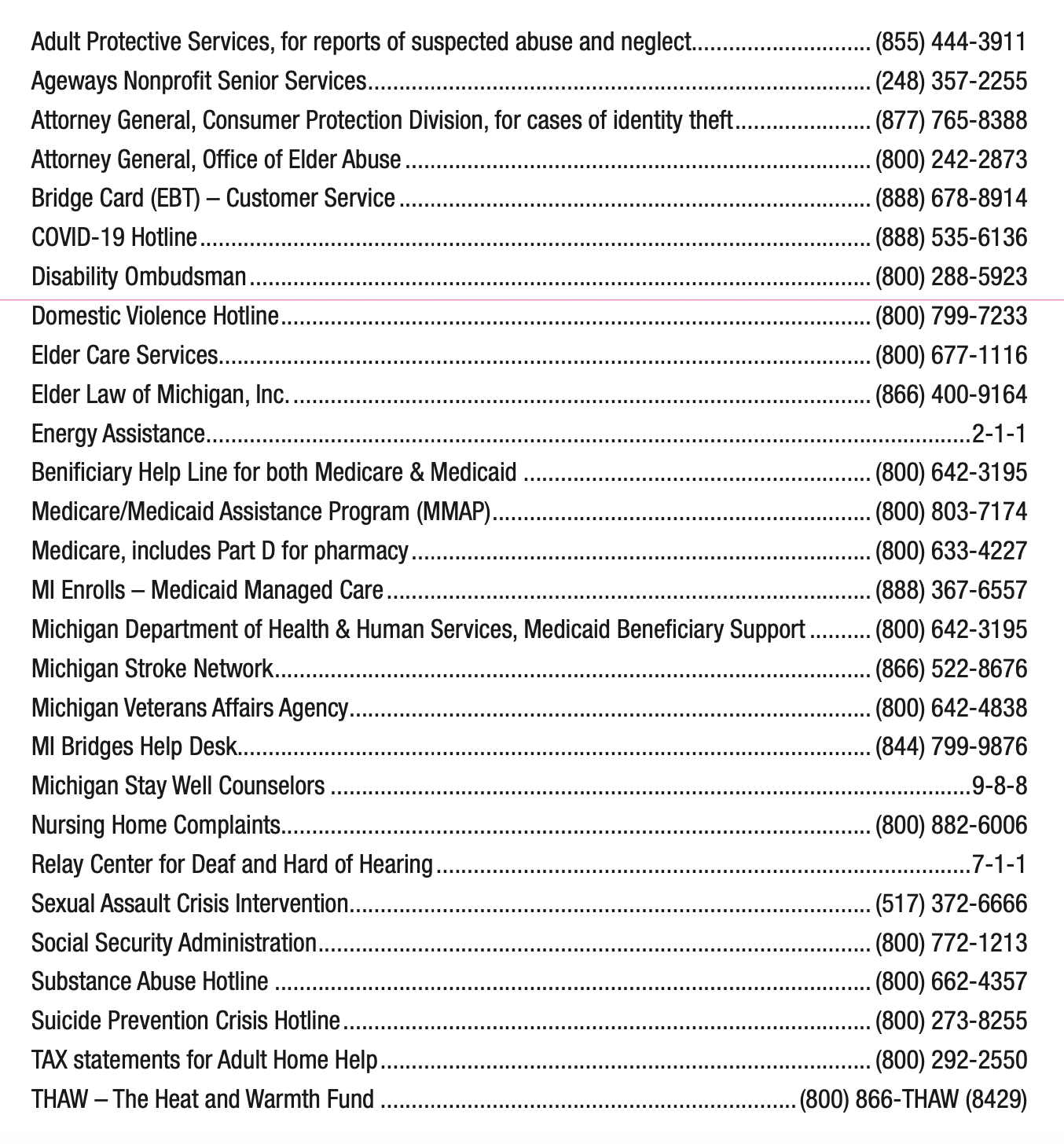
Dear Friend,
From Marquette to the Motor City, Michigan seniors have contributed to the vitality of this state in invaluable ways. For decades, they have brought families to our neighborhoods, business to our storefronts and talent to our workforce. As the very lifeblood of our state, seniors deserve our utmost care and respect. Those words are not just something my colleagues and I at the Michigan Senate believe; they are words we act on.
As your State Senator, I am proud to serve and advocate for you at the Capitol, ensuring you have access to the resources you need to spend your days in confidence and comfort. Read on to learn about exciting legislation we have recently advanced in the Legislature, and some helpful tips and resources to keep you safe and sound. If you ever need assistance navigating any of these changes with our state government, or would like to share feedback and suggestions, you can contact my office via email or by phone.
Working for you,

Erika Geiss
State Senator
District 1

Lowering Prescription Drug Costs
Last year, the Michigan Senate passed Senate Bills 483-485. These bills establish an independent Prescription Drug Affordability Board (PDAB) in Michigan. The PDAB aims to address the issue of implementing measures to regulate prescription drug costs, ensuring that essential medications are accessible and affordable for everyone.
In 2020, while the costs of many goods were rising, the prices of 500 prescription drugs in Michigan increased at a rate twice that of inflation. Michigan Senate Democrats are committed to alleviating the burden of prescription drug costs on Michigan residents and employers — and we are taking meaningful action to combat this persistent problem.
Prescription Drug Affordability Board (PDAB) Would:
- Have the authority to review prescription drug costs and evaluate their impact on Michiganders.
- Be empowered to establish upper payment limits and prevent skyrocketing costs.
- Enable more access to the medications Michiganders need to survive and thrive.
- Bring accountability, oversight and transparency to the prescription drug industry.
- Be made up of unbiased experts with safeguards to prevent external influence.
This bill package has been referred to the House Committee on Insurance and Financial Services to await further action.
Veteran Property Tax Exemption
Our veteran community has selflessly served our nation, sacrificed their time and even risked their health and safety to protect our freedoms. As our veteran community ages, property taxes can become burdensome and make propertyownership difficult to maintain.
That’s why last year, Michigan Senate Democrats led the charge in passing Senate Bills 176 and 330 to amend the General Property Tax Act to require a property tax exemption on real property used and owned as a homestead by a disabled veteran — or the veteran’s surviving spouse — to remain in effect, until rescinded by the individual granted the exemption or denied by the assessor.
Clarifying Michigan’s Cancer Treatment Coverage Law
Under Senate Bill 738 introduced earlier this year, Michigan’s cancer treatment coverage law would explicitly include genetic therapy and immunotherapy such as chimeric antigen receptors T-cells (CAR-T) in the drugs insurers must cover. Michigan law already requires insurers to cover anti-cancer drugs approved by the Food and Drug Administration (FDA), but at least one major insurer has denied coverage for CAR-T, arguing that genetic therapy was not a drug. In cancer treatment, delay can mean death. By codifying and reinforcing the stated policy of the Dept. of Insurance and Financial Services that these FDA-approved immunotherapies must be covered, insurers would be blocked from finding an excuse to delay or deny coverage for modern cancer therapies.
This bill has been referred to the Senate Committee on Finance, Insurance, and Consumer Protection to await next steps.
Budget Funding For Seniors
Setting the state budget year after year is an opportunity to show Michiganders who and what we value through the allocation of financial resources. In addition to the exciting legislative wins passed last year, the Michigan Legislaturemade significant investments in our senior community through the Fiscal Year 2023 budget.
Some of those investments include:
- $28 million in federal Coronavirus State Fiscal Recovery Fund (American Rescue Plan/ARP) revenue to construct, renovate, or relocate four senior, community, or multigenerational centers
- $1.2 million in federal ARP funds to create an electronic implementation solution for Senior Project Fresh, which aims to enhance nutrition education and develop alternatives for communities without internet accessibility
- $568,100 of federal ARP funds to enhance and improve the ability of the adult protective services system to investigate allegations of abuse, neglect and exploitation of seniors
- $1 million to provide home- delivered meal programs (Meals on Wheels) through the Area Agencies on Aging
- $1.7 million to increase Medicaid fee-for-service reimbursement rates by 10% for home-based skilled nursing care, physical therapy and nurse’s aide services

Wayne County Senior Services
3600 Commerce Court, Building E, Wayne, MI 48184
(800) 851-1454
If you’re looking for information on senior services available in Wayne County, check out the seniors’ section of their website at waynecounty.com/departments/seniorservices. Be sure to check out their online resources — they have quite a bit of good information, including resources about aging well, volunteering, donations, meals, legal issues, and local services.

New Social Security Administration Impersonation Scam
Michigan Attorney General Dana Nessel is urging residents to be on high alert for a new impersonation scam after the Social Security Administration (SSA) Office of the Inspector General (OIG) issued an alert warning about criminals posing as SSA OIG agents and demanding in-person meetings to hand off cash. SSA OIG agents will never pick up money at your door or in any type of exchange.
Consumers who believe they have been a victim of this crime should file a complaint with the FBI Internet Crime Complaint Center at ic3.gov and report the scam to SSA OIG at oig.ssa.gov.
The Attorney General’s Government Imposter Scams alert advises consumers who have received communications from imposters to protect themselves from these scams by:
- Blocking the text, email, or call
- Not clicking links or opening attachments • Reporting the text or email as spam
- Deleting the text or email from their device
The Attorney General’s alert also reminds consumers that government agencies will not
- Promise to increase benefits or fix an issue if a fee is paid
- Threaten arrest or legal action unless money is sent immediately
- Demand payment in the form of gift cards, wire transfers, prepaid debit cards, cryptocurrency, or cash sent by mail

Medicare Scams
The Michigan Dept. of Insurance and Financial Services (DIFS) and the Michigan Department of Health and Human Services (MDHHS) are warning seniors to protect themselves and their personal information from potential scams and high-pressure sales tactics.
Fraudsters posing as Medicare “representatives” are calling unsuspecting consumers about their Medicare coverage and asking for Medicare ID numbers or other personal information, such as a Social Security Number or date of birth. Once scammers have this information, they can use it to make unauthorized changes to your Medicare plan.
DIFS and MDHHS have some important tips for protecting yourself:
- Never give your Medicare number or other personal information to an unknown caller. You are always able to get information on Medicare plans without providing an ID number. The only time the Medicare ID number is required is when you are actively enrolling in a plan.
- Do not give out your personal information if someone calls or visits your home and says they’re from Medicare. The Centers for Medicare and Medicaid Services will never call or send someone to your home to ask for personal information or check your Medicare number.
- Don’t trust caller ID. Scammers use technology to make it look like they are calling from a legitimate business or government agency.
- Ignore anyone who calls saying you must join their prescription drug plan, or you will lose your Medicare coverage. While it is true that there may be a penalty if you delay enrolling in the Medicare prescription drug plan (also known as Part D), that coverage is voluntary.
- Don’t trust mailers that appear to be government communications but are advertisements for private companies. These mailers will sometimes have a disclaimer, but it is buried in small print.


